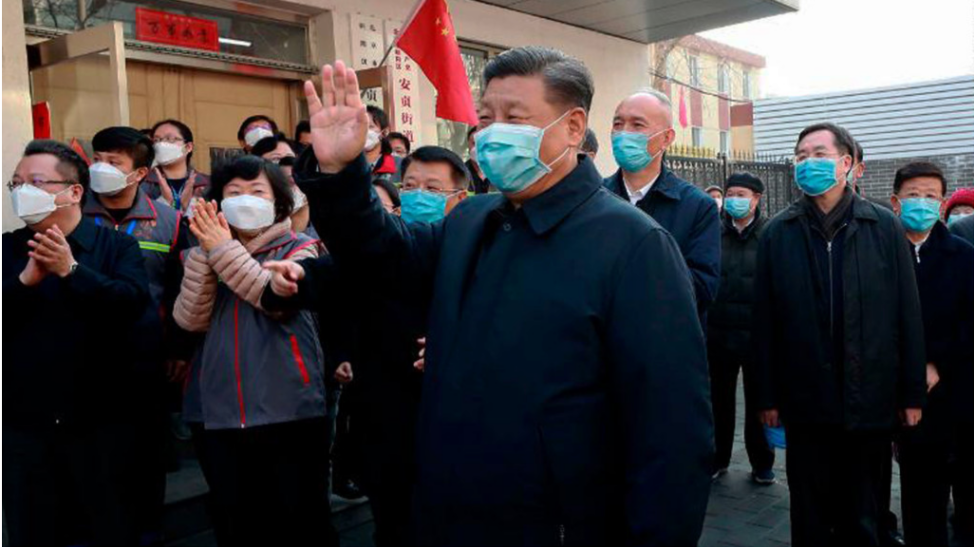While countries attempt to protect their vulnerable populations and limit the death toll as best they can, China has launched a vigorous and calculated disinformation campaign amidst the ongoing worldwide COVID-19 crisis. The global pandemic would not have spread as quickly or as far as it has if the Chinese government accurately reported on the virus and properly handled the onset of the crisis. One study has shown that if China intervened even three weeks earlier, cases could have been reduced by as much as 95 percent, and the global spread of the virus would be a fraction of the current size. Instead, the Chinese government has promoted irregular reporting on the virus’s impact domestically, resulting in a lack of accurate statistics and information for researchers and officials outside of China. As a result, the international community’s readiness for this latest security issue has been weakened, and China’s population remains at risk.
Evidence indicates that the virus originated in bats and was and could have transferred to a pangolin carrier via a wet market – a marketplace selling live animals of different species considered to be a perfect breeding ground for viruses to spread from carrier animals to human hosts. However, in recent weeks, China’s Ministry of Foreign Affairs has propagated the idea that rather than the virus originating in Wuhan, China — as is the general scientific consensus — the virus was actually brought to China by the U.S. Army in October 2019. If this were true, though, the COVID-19 timeline would likely trace the earliest transmissions of the virus back to the U.S. military presence in China or the United States. Other conspirators have theorized that the virus deployed from a Wuhan biological research facility and may have been a consequence of a biological weapons program, but analysis of the COVID-19 genome supports the fact that the virus originated naturally.
Despite this, Chinese officials began laying the groundwork for this conspiracy by casting doubts on the virus’s association to a Wuhan wet market, mainstreaming dubious claims rampant on Chinese social media, and building upon the case that the virus was imported to China. Other states, such as Iran, Russia, and North Korea, have since echoed China’s claims, sowing further distrust and chaos.
Among its latest attempts to control the narrative, China revoked reporting privileges for journalists from The New York Times, The Washington Post, and the Wall Street Journal with a deadline for media passes to be returned to the Chinese government within 10 days of the decree. Further, Chinese officials are requiring journalists from these papers, along with Time and Voice of America, to relinquish any reports regarding COVID-19 to the Chinese government. China has resorted to these steps after initially blundering its early response, censoring medical experts in Wuhan and slow-rolling international assistance for weeks.
While China claims to now be ahead of COVID-19, much of the reporting on China’s statistics and figures needs to be taken with a grain of salt. China has displayed irresponsible inaction in the early stages of the virus, shown inconsistent and inaccurate reporting throughout the pandemic, and has even attempted a narrative change regarding the origins of the virus. At this point, states must rely on the available data from domestic cases and on trusted international institutions, like the World Health Organization. Italy and Spain are among the most severely affected, and the US is preparing for an exponential growth of cases in the coming weeks. As the first state to see the crisis evolve, China had a responsibility to the international system’s security and ultimately chose not to act or cooperate. The international community must currently focus on combating the virus; however, a blind eye cannot be turned to China’s role. China ultimately should be held responsible for its handling of the crisis by international condemnation or sanctions from countries like the United States and international organizations like the United Nations.
Ayah Abdul-Samad is a second-year graduate student in the International Security program at the Schar School of Policy and Government. She has a BA in International Affairs from Marquette University, with a concentration in Third World Studies and a minor in Arabic Studies. She has previously worked with the Syrian American Council in Chicago, and is currently a Global Intelligence Analyst with the World Bank. Ayah’s main research interests focus on Middle East security issues and CBRN proliferation in similar areas.
Photo can be found here.




